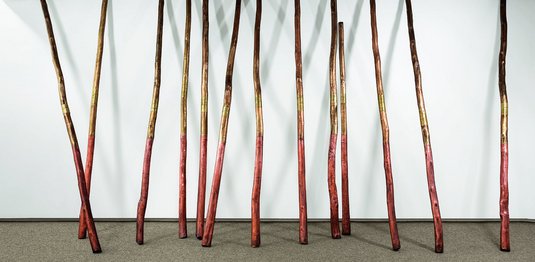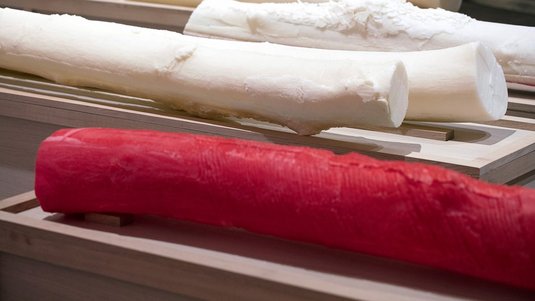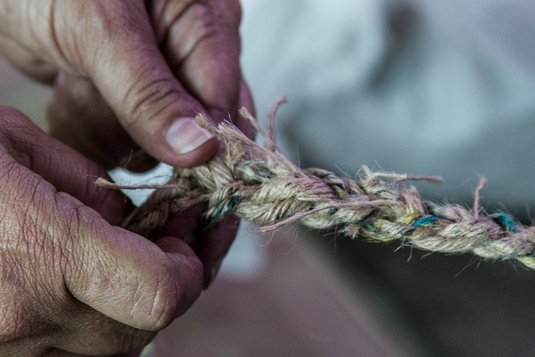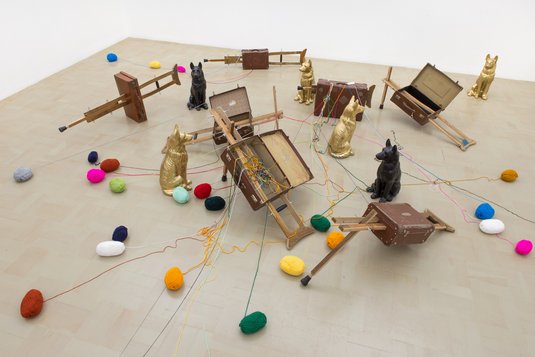Museum
Global(e) Resistance
29 Jul 2020 - �4 Jan 2021

The event is over

Barthélémy Toguo, « Urban requiem », 2015 (détail) © Courtesy Galerie Lelong & Co. et Bandjoun Station © Adagp, Paris, 2020
The "Global(e) Resistance" exhibition reveals for the first time the works of more than sixty artists brought together in the course of the last decade, a majority coming from the South (Africa, the Middle East, Asia, Latin America) and adopts the ambition of examining contemporary resistance strategies.
"Global(e) Resistance" also poses theoretical questions ranging from the articulation of aesthetics and politics to the museum's own relationship with politics, in the worlds of art.

Barthélémy Toguo, « Urban requiem », 2015 (détail) © Courtesy Galerie Lelong & Co. et Bandjoun Station © Adagp, Paris, 2020
Podcast
Resisting through a practice that is both artistic and political, even activist, has often been the prerogative of artists living in situations of oppression or inequality. The end of colonisation prompted the upsurge of many voices that were raised in order to open up new pathways of resistance, whether on a purely political level or in order to question histories, memories that refuse to be silent or are threatened with annihilation. Resistance has also been organised thanks to art itself, in a poetic or discursive manner.
The project gives pride of place to political protest in the era of decolonisation and the collapse of communist ideologies after 1989, while tackling current reinterpretations of history by excavating and recording memory. It takes as its point of departure two foundational works from the 1990s in the collection of the Centre Pompidou: the film The couple in the cage (1993), in which Coco Fusco and Guillermo Gómez-Peña question the contemporary persistence of colonial reflexes, and the video Partially Buried (1996), in which Renée Green brings to light the role of subjective memory in the writing of history. In a period of tumult and emergency, it is important to explore how these protests participate in the transformation of thought systems and modify perception of the world.
Visitors are welcomed to the forum by the sculpture Rédemption [Redemption] by Barthélémy Toguo, revealed in the Centre Pompidou for the first time since its acquisition. The work evokes the North-South encounter, pan-Africanism and the question of the redemption and salvation of peoples. The project is then deployed over nearly 1500m2 on the fourth floor of the permanent collections (museum gallery, Galerie d'Art Graphique, Galerie 0). The layout is punctuated with slogans printed on the walls, taken from works by Barthélémy Toguo. These manifesto-works open the exhibition: Guy Ben Ner and Khalil Rabah evoke the Israeli-Palestinian conflict, Teresa Margolles examines the Mexican border, Yin Xiuzhen armed conflicts and Nadia Kaabi-Linke the wandering of migrants and the homeless.
Inspired by Robert Smithson, the work of Renée Green initially structures a polysemic resistance strategy considered on the scale of landscape and region, but also attached to a private memory. The complex imaginary world of certain cities like Braddock (LaToya Ruby Frazier), Johannesburg (Subotzsky and Waterhouse), Dakar (Cheikh Ndiaye), marked by economic decline, socio-political protest or urban recomposition, haunts many works.
At the same time, artists support the fervour and anxiety arising out decolonisation (Kiluanji Kia Henda, Abdoulaye Konaté), especially in South Africa where apartheid persisted until 1991 (Penny Siopis, Kemang Wa Lehulere, Sue Williamson). The questioning of communist theory introduced by The Propeller Group and the progression of an authoritarian world reflected by Pratchaya Phintong's installation, are the point of departure for committed works that attempt to reconcile individual narratives and collective traumatisms. The works of Chim↑Pom and Yin Xiuzhen denounce the ecological threat. In a more contemplative section, literature and philosophy act as receptacles for a more underground resistance, as in the work of Mohssin Harraki, M’barek Bouhchichi or the emblematic work Facing the Wall by Song Dong, blending Zen and spiritual combat.
In a second stage, following on from the Amerindian masquerade of Fusco and Gómez-Peña, certain residues of the colonial world awaiting a multicultural reconfiguration are brought to light: the ethnographic "circus" of the "good nigger" in Brazil (Jonathas de Andrade) is brought into negotiation in a world bowed with the weight of scars (Otobong Nkanga). Further on, the idea is to envisage the question of mobility in the heart of the contemporary capitalist system: migrations (Younès Rahmoun, Halil Altindere), the body as a tool for resistance (Evelyn Taocheng Wang, Ming Wong) sustain a series of works seen as crossing points. Feminist struggles are activated in the work of Susan Hefuna and Marcia Kure, along with new considerations of questions relating to gender.
In order to present an account of the commitments and strategies of the artists, a Salon and documentary showcases envisaged as a discursive space welcome visitors at the entrance to the 4th level. They also shed light on the commitments of certain "scenes" of activism based in France.
A catalogue was made with essays by Christine Macel, Alicia Knock and Yung Ma on problems dealing with aesthetics and politics, based on the works in the collection, thanks to the support of the Friends of the Centre Pompidou.
The artists
Georges Adéagbo (Né en 1942 à Cotonou, vit et travaille à Cotonou et Hambourg)
Halil Altindere (Né en 1971 à Mardin, vit et travaille à Istanbul)
Jonathas de Andrade (Né en 1982 à Maceió, vit et travaille à Recife)
Malala Andrialavidrazana (Née en 1971 à Madagascar, vit et travaille à Paris)
Iván Argote (Né en 1983 à Bogotá, vit et travaille à Paris)
Kader Attia (Né en 1970 à Dugny, vit et travaille à Berlin)
Marcos Avila Forero (Né en 1983 à Paris, vit et travaille entre Paris et Bogotá)
Omar Ba (Né en 1977 à Loul Sessene, vit et travaille à Dakar et à Genève)
Sammy Baloji (Né en 1978 à Lubumbashi, vit et travaille à Bruxelles et à Lubumbashi)
Yto Barrada (Née en 1971 à Paris, vit et travaille à New-York)
Taysir Batniji (Né en 1966 à Gaza, vit et travaille à Paris)
Guy Ben-Ner (Né en 1969 à Ramat Gan, vit et travaille à Tel Aviv)
Lotfi Benyelles (Né en 1974 à Alger, vit et travaille à Fontenay-sous-Bois)
M’Barek Bouhchichi (Né en 1975 à Akka, vit et travaille à Tahannaout)
Jan Brykczynski (Né en 1979 en Pologne, vit et travaille à Varsovie)
Chen Chieh-Jen (Né en 1960 à Taoyuan, vit et travaille à Taipei)
Chim Pom (Collectif japonais formé en 2005 à Tokyo, actif, à Tokyo)
Liu Chuang (Né en 1978 à Hubei, vit et travaille à Shanghaï)
Song Dong (Né en 1966 à Pékin, vit et travaille à Pékin)
LaToya Ruby Frazier (Née en 1982 à Braddock, vit et travaille à New-York et à Chicago)
Coco Fusco et Guillermo Gómez-Peña (Respectivement nées en 1960 à New York, et en 1955 à Mexico Vivent et travaillent à New York)
Meschac Gaba (Né en 1961 à Cotonou , vit et travaille entre Rotterdam et Cotonou)
Renée Green (Née en 1959 à Cleveland, vit et travaille à Berlin et à San Francisco)
Hazem Harb (Né en 1980 à Gaza, vit et travaille à Rome et à Dubaï)
Mohssin Harraki (Né en 1981 à Assilah, vit et travaille à Paris)
Susan Hefuna (Née en 1962 à Berlin, vit et travaille à Düsseldorf et à New-York)
Anna Hulačová (Née en 1984 à Sušice,vit et travaille à Prague)
Nadia Kaabi-Linke (Née en 1978 à Tunis, vit et travaille à Berlin et à Kiev)
Katia Kameli (Née en 1973 à Clermont-Ferrand , vit et travaille à Paris)
Bouchra Khalili (Née en 1975 à Casablanca, vit et travaille à Berlin)
Kiluanji Kia Henda (Né en 1979 à Luanda, vit et travaille à Luanda)
Jems Koko Bi (Né en 1966 à Sinfra, vit et travaille entre Abidjan et Essen)
David Koloane (Né en 1938 à Alexandra, mort en 2019 en Afrique du Sud)
Abdoulaye Konaté (Né en 1953 à Diré, vit et travaille à Bamako)
Marcia Kure (Née en 1970 à Kano, vit et travaille à Princeton)
Hayoun Kwon (Née en 1981 à Séoul, vit et travaille à Paris et à Séoul)
Firenze Lai (Née en 1984 à Hong Kong, vit et travaille à Hong Kong
Goddy Leye (Né en 1965 à Mbouda, mort en 2011 à Bonendale)
Ibrahim Mahama (Né en 1987 à Tamale, vit et travaille à Accra)
Jawad Al Malhi (Né en 1969, Jérusalem, vit et travaille autour du Shufat Refugee Camp)
Teresa Margolles (Née en 1963 à Culiacán, vit et travaille à Madrid)
Paulo Nazareth (Né en 1977 à Governador Valadares, vit et travaille autour du monde)
Cheikh Ndiaye (Né en 1970 à Dakar, vit et travaille à Dakar et à New York)
Otobong Nkanga (Née en 1974 à Kano, vit et travaille à Anvers)
Sara Ouhaddou (Née en 1986 à Draguignan, vit et travaille à Rabat)
Akosua Adoma Owusu (Née en 1984 à Alexandria (Virginia), vit et travaille au Ghana)
Pratchaya Phinthong (Né en 1974 à Ubon Ratchathani, vit et travaille à Bangkok)
The Propeller Group (Collectif formé en 2006 à Ho Chi Minh-Ville, actif à Ho Chi Minh-Ville et à Los Angeles)
Khalil Rabah (Né en 1961 à Jérusalem, vit et travaille à Ramallah)
Younès Rahmoun (Né en 1975 à Tétouan, vit et travaille à Tétouan)
Zineb Sedira (Née en 1963 à Paris, vit à Londres et travaille entre Paris et Alger)
Penny Siopsis (Née en 1953 à Vryburg, vit et travaille à Cape Town)
Mikhael Subotzky (Né en 1981 à Cape Town , vit et travaille à Johannesburg)
Patrick Waterhouse (Né en 1981 à Bath, vit et travaille en Italie et en Afrique du Sud)
Evelyn Taocheng Wang (Née en 1981 à Chengdu, vit et travaille à Rotterdam)
Barthélémy Toguo (Né en 1967 à Mbalmayo, vit et travaille à Paris et à Bandjoun)
Thu Van Tran (Née en 1979 à Ho Chi Minh-Villeit et travaille à Paris)
Kemang Wa Lehulere (Né en 1984 à Cape Town, vit et travaille à Cape Town)
Hajra Waheed (Née en 1980 à Calgary, vit et travaille à Montréal)
Sue Williamson (Née en 1941 à Lichfield, vit et travaille à Cape Town)
Ming Wong (Né à Singapour, vit et travaille à Berlin)
Yin Xiuzhen (Née en 1963 à Pékin, vit et travaille à Pékin)
Billie Zangewa (Née en 1973 à Blantyre, vit et travaille à Londres et à Johannesburg)
When
11am - 8pm, every days except tuesdays
Where
Partners
En partenariat média avec










